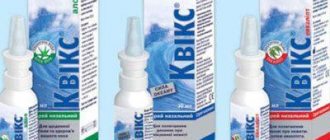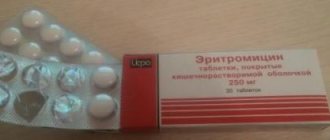Pharmacological properties
Pharmacodynamics
Snoop is a local vasoconstrictor with alpha-adrenomimetic activity. Xylometazoline helps to narrow the blood vessels of the nasal mucosa, relieves swelling and eliminates hyperemia of the nasal mucosa, which leads to rapid relief of nasal breathing. The patency of the nasal passages is restored within a few minutes after using the drug.
Sea water tends to improve the function of the ciliated epithelium and normalize the production of mucus in the goblet cells of the nasal mucosa. Its presence in the composition of the drug helps maintain the natural physiological state of the nasal cavity.
The duration of action of the drug is several hours.
Pharmacokinetics
The absorption of xylometazoline when applied topically is very low; modern analytical techniques do not allow determining its concentration in the blood plasma.
Contraindications and side effects
Diseases whose main symptoms are rapid heart rate and increased pressure in peripheral vessels are contraindicated.
Contraindications for taking Snoop:
- narrowing of the lumen of arterial passages;
- hormonal shift in the body due to dysfunction of the thyroid gland;
- pulse over 100 beats per minute;
- intraocular, blood pressure is higher than normal;
- allergy to the main and auxiliary components;
- chronic inflammation of the nasal mucosa.
A group of diseases for which you should consult a doctor before taking the drug:
- hyperglycemia (diabetes mellitus type 1, 2, glucose intolerance);
- IHD;
- prostate hypertrophy.
According to the instructions, you should not use the medicine during pregnancy or breastfeeding. Should be used in children only after 2 years of age.
Undesirable side effects when taking the drug concern the respiratory system, central nervous system, heart and blood vessels.
It could be:
- Opposite reaction of the nasal mucosa:
- increased secretion;
- dry nose;
- difficulty inhaling through the nose due to swelling in the nasal passages and cavities;
- feeling of irritation at the spray site.
- Disturbances of neuro-regulatory function:
- rarely – headache;
- restless sleep;
- dizziness;
- blurred vision;
- depressed state.
- Cardiovascular abnormalities concern pulse and pressure: heart rate increases with signs of rhythm disturbance; the pressure in the blood vessels rises above normal.
Contraindications
- atrophic rhinitis;
- tachycardia;
- arterial hypertension;
- severe atherosclerosis;
- glaucoma;
- thyrotoxicosis;
- surgical operations on the meninges (history);
- pregnancy period;
- individual intolerance to Snoop's components.
Age contraindications:
- 0.05% solution: children under 2 years of age;
- 0.1% solution: children under 6 years of age.
According to the instructions, Snoop should be used with caution in diabetes mellitus, severe cardiovascular diseases (including coronary heart disease), prostatic hyperplasia, pheochromocytoma, porphyria, hyperthyroidism, breastfeeding, hypersensitivity to adrenergic drugs [accompanied by increased blood pressure (BP), dizziness, insomnia, arrhythmia, tremor], concomitant therapy with MAO inhibitors (monoamine oxidase), tricyclic antidepressants, blood pressure-raising drugs.
Otrivin
Otrivin is a nasal drug whose active ingredient is similar to Snoop. This is a new generation remedy for the common cold, since some dosage forms contain not only xylometazoline, but also sea water. Microelements present in the seawater solution improve the functioning of the ciliated epithelium. Otrivin is available in the form of a nasal spray and drops. Due to the fact that the product is foreign-made, its price is almost the same as for Snoop, 139-537 rubles. It is worth noting that the use of the remedy for the common cold is recommended for children from one year of age; children's drops are not available for infants. Adverse reactions are typical of those observed when using Snoop, but in addition, depression may develop during use. The drug is contraindicated in pregnant women, but can be used during breastfeeding. Dosing nasal drops is quite problematic, so it can end up in the throat, which increases the likelihood of side effects.
Pros:
- Effective for nasopharyngitis
- Has a moisturizing effect (Otrivin More)
- The therapeutic effect of use lasts up to 12 hours.
Minuses:
- Contraindicated in atherosclerosis
- Should be used with caution in case of prostate adenoma
- May provoke the occurrence of drug-induced rhinitis.
Instructions for use Snoop: method and dosage
Spray Snoop is intended for intranasal use by injection into each nasal passage, previously cleaned before the procedure.
Before first use, you must prepare the bottle. To do this, remove the protective cap and press the rim of the spray nozzle several times to create pressure inside the bottle. The appearance of a uniform cloud indicates the preparation is ready for use.
To carry out the procedure, the nozzle is inserted into the nasal cavity, holding the bottle in a vertical position, pressing the rim once and taking a light breath through the nose. After use, the bottle is closed with a protective cap.
Do not spray the drug horizontally or downwards.
The bottle is intended for individual use!
The frequency of procedures for adults and children should not exceed three times a day.
Recommended dosage of Snoop:
- 0.05% solution: adults and children over 6 years old – 2 injections each, children aged 2–6 years – 1–2 injections each;
- 0.1% solution: adults and children over 6 years old - 1-2 injections.
The duration of the course of treatment is no more than 7 days.
Composition and properties of the drug
This medication contains one active ingredient – xylometazoline. It belongs to the group of alpha adrenergic agonists. Thus, when administered, this drug stimulates adrenergic receptors that are located on the nasal mucosa. Activation of receptors leads to a narrowing of small vessels, which is accompanied by a decrease in swelling.
The release form of “Snoop” is a spray for administration into the nasal cavity. The bottle contains a clear liquid. This product is available in different concentrations, the most common is a 0.1% solution (a lower concentration of 0.05% can be used for children).
Reviews of Snoop
Reviews of Snoop are mostly positive. The drug fully complies with its pharmacological characteristics - it acts quickly, relieves congestion for a long time, and makes breathing easier. An important advantage of the drug, especially when treating children, is that the body accepts it very easily; there is no unpleasant sensation when administered in the form of bitterness or burning.
Many patients note the convenient form of release of the drug, which makes it easy to use it in the prescribed dose, evenly irrigating the nasal cavity.
There are also negative reviews from patients in whom the drug did not have a therapeutic effect.
Indications for use
The main indication for the use of this spray is shortness of breath, which is caused by swelling of the nasal mucosa. It is the swelling that causes the disturbance in well-being. The main action of Snoop is aimed at eliminating edema, so it can be used for the symptomatic treatment of the following diseases:
- Acute respiratory diseases (including colds). Acute respiratory viral infections (ARVI) are often accompanied by nasal congestion. Usually the symptom does not last long and goes away on its own within a week, but to improve overall well-being, a vasoconstrictor nasal spray is prescribed.
- Allergic rhinitis. When allergies worsen, the nose often gets stuffy and breathing becomes difficult. In this case, local decongestants are prescribed to relieve symptoms. However, it should be remembered that Snoop spray in this case can only be prescribed for a short course.
- Acute or chronic inflammation of the nasal cavity, which is accompanied by swelling. With rhinitis of various etiologies (bacterial, viral, vasomotor), a runny nose often occurs. In this case, a vasoconstrictor spray is prescribed for symptomatic treatment.
- Inflammation of the paranasal sinuses (most often - sinusitis, frontal sinusitis). Sinusitis can also be manifested by a runny nose, in which case symptomatic therapy is required.
- Inflammation of the middle ear. The middle ear communicates with the nasal cavity through the auditory tube. Therefore, reducing nasal swelling may improve otitis media and reduce symptoms (including ear pain and congestion).
- In the form of preoperative preparation for operations on the nasal cavity, as well as after surgery to relieve swelling.
snoop during pregnancy
Girls, hello everyone!
It's week 35. I look back and am perplexed. This pregnancy is very strange for me. Toxicosis, severe detachment at 9 weeks and the threat of miscarriage, no spotting after, suspiciously perfect tests from all places when feeling unwell. A bunch of ARVI with complications in the form of sinusitis, otitis, tonsillitis, bronchitis and conjunctevitis, against which 2 courses of antibiotics were given in the 1st and 2nd trimesters. A very strange paid doctor from a housing complex whom I last saw at 31 weeks, when I received maternity leave. During the entire pregnancy, no injections, IVs or examinations in the chair. Some kind of internal resistance to going to church (last time I didn’t get out). In general, everything is not the same as the first time, so the ending is very, very scary. A feeling of complete lack of control on all sides.
Understanding these facts and remembering the bad history of previous births (EC at 37 weeks due to deterioration of Doppler and the baby not gaining weight), I now decided to puzzle myself with the question of where, when and with whom to give birth. Moreover, the requirements for PKS have become more stringent. Over the past week I have visited 3 maternity hospitals and this is what I got as a result.
Maternity hospital
N1 (the leading old and central maternity hospital in St. Petersburg), my friend works there.
I did the 3rd screening at 32 weeks and 2 dopplers at 29 and 34 weeks. Both Doppler and screening are good. BUT from 32 to 34 weeks (2 weeks) the child gained only 100 grams and thus at 34 weeks he weighed only 1900 grams, which is very little for this period. It was not possible to perform a CTG because the cub was running away. I’ll go for another Doppler test this week at exactly 35 weeks, then at 36 and 37. If the Doppler test is bad, they’ll give me an emergency caesarean. But if the Doppler is formally good, but there is no or minimal weight gain, then they won’t do anything and this really confuses me. A friend said that neither the mildronate that I drink, nor the droppers, for example with Actovegin, affect the baby’s weight, so staying in the hospital is useless and the effectiveness of these drugs has not been proven... Exactly at my 37 weeks they close for ventilation and I fly past this maternity hospital like plywood over Paris if nothing happens first.
Maternity hospital
N2 (maternity hospital in a large residential area of the city), where my favorite doctor has been working for the last few months
, who performed a Caesarean section on me during my first pregnancy and treated me as a day patient for the last 2 months. I went to see him personally, he remembered me, received me very warmly and said that he would not leave me. That despite the lack of a formal referral with my medical history, he knows how to provide me with a CS again. But he does not have the ability to do Doppler, CTG and tests for me and thus guide me. Therefore, every week I send him the results of examinations from maternity hospital N1 and he looks to see if it’s time for me to be hospitalized and have a caesarean section as planned. The worst problem occurs during force majeure - my water breaks, blood starts flowing, etc. In such a situation, he can’t help me in any way... Since I can only get to his CS through a prenatal referral from the LCD.
Maternity hospital
N3 (in the nearest suburb of St. Petersburg, where I gave birth last time), but my doctor no longer works there (he works in maternity hospital N2 cm above).
My husband and I went to talk to the manager. She formally received us well and said that she remembered me, which was strange. That there will definitely be a cesarean section and she doesn’t need any referrals. She didn’t make an appointment for me for the planned date of the operation (she makes an appointment for everyone!). I signed up for a daily hospital stay under compulsory medical insurance. I need to come on an empty stomach on May 3 (36 weeks), May 10 (37 weeks) and maybe May 17 (38 weeks) they will do tests for me, Doppler and CTG and will think about when it’s better to have a caesarean section. The manager, of course, wants to keep me until 39 weeks, but I really hope that before that moment some kind of problem will come out again and I will be operated on earlier. The baby’s weight didn’t bother her, it’s very strange to me! And for some reason she also said that, given my medical history and hypercoagulability, it would most likely be necessary to undergo general anesthesia. It’s strange again, considering that last time I begged for general anesthesia, but in the same maternity hospital they convinced me that it was bad, and now the child will be very low birth weight and they recommend it to me.
Girls, what do you think, maybe I'm missing something? Somehow I’m not at peace. How can I not be left between 3 chairs... Which maternity hospital to choose if I can choose?
And I am also very worried about my cold. Not only have I not gotten off baby Snoop for the last month. I saw an ENT specialist, he said that it was just swelling of pregnancy, which intensified in the evening and while lying down. So I also caught a cold again. I’m undergoing treatment, but I still have snot and a wet cough 2-3 times a day with expectoration, and in this condition they may not take me to the hospital...
Terms of use
The spray is introduced into the nasal cavity by spraying. Before using it, it is necessary to thoroughly clean the nose. In cases where nasal congestion is accompanied by the presence of copious discharge (especially purulent and not mucous in nature), it is necessary to rinse the nose with saline solution or a non-concentrated solution of sea salt. If there is no heavy discharge, just use a handkerchief.
After cleaning the nose, it is necessary to spray the spray into the right and left nostrils once each. To consolidate the effect, it is necessary to repeat the procedure every 6 to 8 hours (3 times a day) until the acute symptoms of the disease disappear.
When using the drug, especially in children, you should monitor your general health and the occurrence of allergic reactions. If a skin rash, swelling, loss of consciousness or breathing problems occurs, you should immediately seek medical help.
It should be remembered that the duration of treatment with vasoconstrictors should not exceed 5 to 7 days. Otherwise, addiction occurs. In addition, prolonged vasoconstriction causes the nasal mucosa to receive less blood than necessary. As a result, atrophy and increased dryness of the mucous membrane may develop.










